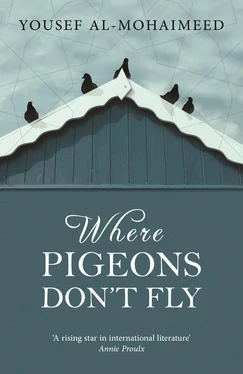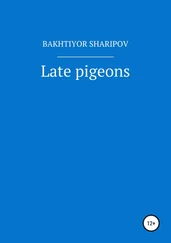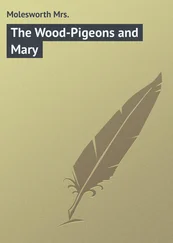‘Yes,’ she had said, explaining that the insulation in the bedroom walls muffled his voice. He never found out the truth: that she was trying to keep her voice from the ears of her mother, who hovered in corners like bats in the dark.
A girl is like a matchstick, her mother would constantly remind her: she could only be used once. She meant that Noha should hold on to her virginity. The thought that Noha’s fingering might lead her to a sticky end terrified the mother, and her fear grew when she saw her playing blind man’s buff in the dark with her cousins. Whenever they caught each other she was convinced they must be canoodling.
Her poor mother.
Noha remembered the time she had been asleep or, to be exact, pretending to sleep, lying on her stomach as her cousin Samer, stretched out beside her playing his Game Boy, threw his hand across her and brushed up against her.
‘What a fool,’ thought Noha.
Noha had a male friend who she found out was gay. More worrying to her was that either he hadn’t realised it himself, or was unsure, or even that he went both ways, with women and with men. He would sometimes say things that would never pass a man’s lips: ‘Ha ha. Someone lift me up.’
She felt that the manliness of any young fellow in the habit of saying such things was open to question. Maybe the trickiest moment came when she sent him a risque image of herself, and pleaded with him to reply in kind, only to receive a photograph of his bottom, taken in the lavatory of a fast food restaurant.
Discussing his relationship with his last girlfriend he told Noha of peculiar moves that could only be of interest to someone with homosexual leanings.
Noha sent Fahd an intimate picture of herself, which she had saved on her laptop. One day she was with her sister Nadia, browsing through the picture folder where she kept images of the latest fashions. The girls were getting ready to attend their cousin’s wedding. The laptop was perched on the revolving chair in her bedroom and her sister was busy talking about the girls at school. She quietly spun the chair round before Nadia could catch sight of the shot, her heartbeat rising and her face colouring as she imagined her sister seeing it, not that she was sure she hadn’t. What would she tell her? Either that it was of her, in which case she had no reason for keeping it unless she had sent it to somebody, or that it was of someone else, which opened up another can of worms, and implied she had lesbian tendencies.
— 21 —
FAHD DIDN’T STAY WITH Noha, the Paper Moon girl, for long. Saeed was right: it was too much trouble waiting to get free of her armed bodyguards and easier to take oneself off to another, riper girl, who was easier to talk to and meet.
One evening Fahd paid a visit to Faisaliya Tower where he had organised a group art exhibition in the mall’s central hall, which allowed women strolling around the shops to stop and take in a picture. He was looking at a beautiful canvas entitled Daughters of the Rain , an abstract depiction of village girls cavorting beneath showers of rain, when he was startled by a woman in her late thirties standing next to him and looking at the same picture. Flustered, he moved to the next picture, only to find her next to him again, examining it through her niqab .
‘The brother’s an artist?’ she asked boldly.
‘Yes,’ he answered.
She talked to him about Daughters of the Rain , why the artist had given such prominence to the colour blue when the rain clearly brought such joy and pleasure. He was on edge and anxious as he spoke to her, looking about in fear lest one of them dropped down from the top of the tower clad in his light cotton mashlah . Little did he know that his time would come later, one melancholy morning as he sat with his lover Tarfah in Starbucks, from where they would lead him away to face charges not merely of illegally consorting with a female, but also of using feigned affection and black magic to exercise his influence over the hapless girl.
The woman, whose name he later learned was Thuraya, was talking knowledgeably about the picture in the delectable, adorable lisp of the Hejaz, with her striking embroidered red headscarf and the perfume that filled his nose and mind. Were it not for her telling him that she was a mother of six, the oldest of whom was about his age, and her faintly husky voice, he would have been unable to guess that she was in her late thirties.
She had married young to a man from Qaseem and left the Hejaz, a place which made her coo like a pigeon whenever she mentioned it: ‘You’re fine and soft like a Hejazi!’
All that was beautiful, fine and wonderful in life had its origin in the Hejaz; the vulgar and barbarous belonged to the Bedouin. Thuraya was fiercely partisan towards her place of birth. Unembarrassed, she brought up her age and claimed that as a woman from the Hejaz her years didn’t show and that her eyes were still young and passionate: ‘The eyes of our women speak.’
Two days later she called him on his mobile on the pretext that she had some preliminary sketches for paintings she wanted to make. ‘Just a bored housewife’s feeble efforts,’ she called them, with an exaggerated laugh that sounded like racing cars speeding past. She hoped to get an opportunity to give them to him and get his opinion. They agreed that he would take them from her on a Monday, when she went to the Dr Shablaan Clinics to get her son treatment for his speech defect.
On the Monday he stopped the car in the dusty square next to the building and went inside, going up to the second floor, inspecting the signs of the individual clinics, then leaving again. He called her and said that he had gone back to the car and wouldn’t be coming up because it was difficult to see her there. She came striding out in high heels and almost fell on the uneven ground as she made for the car. He suppressed a malicious laugh and as soon as she got in, he noticed her confusion and the trembling of her hand. He shook it and she quickly freed it from his grasp. Her carefully ironed, soft black headscarf hung loosely over her niqab -rimmed eyes. She was extremely shy. Fahd could see no part of her save her hand and a ring of white gold. She only stayed three minutes. Saying she felt confused, she handed him a large envelope and left.
The next time they spoke she said, ‘I’ll see you at Uthaim Mall opposite Atiqa market. Turn right as soon as you’re inside. There’s a little bookshop beside the escalator; I’ll be there before the evening prayer.’
After sunset prayers he took a stroll in the mall. He went up the escalator. Children were stampeding towards the games arcade, wearing green bracelets on their wrists that allowed them to play all day long. He went back to the bookshop and looked through the books. Most had an Islamic theme. He picked one out by Sheikh al-Qarani and read on the cover: The book that has sold a million copies . He put it back and searched for some poetry or novels in translation. He sensed someone breathing nearby and a penetrating female perfume tightened about his throat. He turned to see a young woman drawing a headscarf across her mouth. She fixed him with her eyes, the eyeliner applied with exquisite care and the eyeshadow a light pink that matched the smooth pearls covering her handbag. From the opposite direction he received a sudden kick. It was Thuraya. He hadn’t noticed her come in.
‘Surrounded by admirers I see!’ she said, gritting her teeth and handing him a coloured paper bag as she looked about warily.
In the car he found a box wrapped in gift paper at the bottom of the bag and opened it quickly and eagerly. A bottle of cheap aftershave. He laughed.
A few days later as he was cleaning out his car he picked up the bag to throw it away and discovered a card with the silhouette of a man and woman embracing while the sun set into the sea behind them. On the back he read: I love you Fahd, but I’m scared that you’ll reject my love and my crazy passion because I’m older than you, maybe the same age as your mother!
Читать дальше












